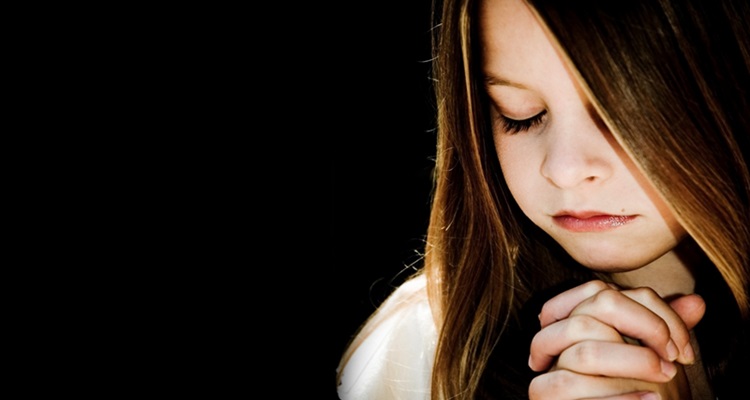Where to start? Leelah‘s Alcorn story is a sad one, with a sad ending. And it‘s spread around the world as a lesson to those who oppress fragile teenagers who are coming to terms with their own identity. Teenagers who need to be told things will be alright, not that they‘re wrong.
It‘s a sad story indeed, but what it isn‘t is unique. Transgender and gender-nonconforming people are almost nine times more likely to attempt suicide than average, according to a survey released in the United States in 2011.
The study shows that while the overall US average for lifetime suicide attempts is 4.6%, transgender and non-genderconforming people score a whopping 41% average.
Let‘s think about that: Four out of ten will attempt to take their own life at least once. Almost half.
And those are not the highest rates you can find for this demographic in similar studies. Also, keep in mind that those numbers are based on the people who lived to tell. Some say that those who succeed, like Leelah, account for up to 31% of the Transgender population.
And that‘s not counting those who choose to do so without ever saying why – a group of people whose number we may never know, but should never be ignored in this context.
Before we try to understand Leelah‘s case, let‘s wonder a little about WHY transgender and non-genderconforming people do commit suicide.
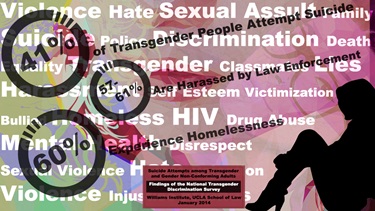
The study mentioned above identifies certain factors that can increase the chance of a suicide attempt, such as race, income, being „out“, having HIV, having a disability, being harassed or bullied at school or work, being denied medical treatment, suffering physical or sexual violence at work, school or by law enforcement, being cut off or ignored by family and … being young.
You see, being a teenager is difficult for most people. You may remember it yourself. Teenagers go through a lot of physical and mental changes and many are very self-aware. It is common amongst them to wish to fit in, and many are willing to go to great lengths to do so. They are trying to identify who they are. What it means to be „them“ and what sort of life they want to live. At the same time, they are aggressive and judgemental towards each other, at the very years they are most sensitive to criticism. It‘s not easy growing up, and building a self-image, and many teens struggle with it as is.
Now imagine yourself as a teenager, and that you know deep down that you are different. You are, if you will, a caterpillar waiting to become a butterfly (I never really liked that metaphor, but it works well enough to make this point), and you know that you will need to rebuild your self-image once you will. In essence, you will reset it, and this means resetting your sence of self-worth as well (at least partly), because you will no longer base that on your „old self“. What it means is that you are breaking down the walls you‘ve built over the years to protect yourself.
Being a teenager is hard. Being a transgender teenager, seeing everyone around you developing into what they‘re meant to be, except for yourself – that‘s excruciatingly hard. You will need the support of everyone around you, especially your family and closest friends. You will be vulnerable, and subject, to criticism, ridicule, hatred, violence and discrimination. This is what we call transphobia and it is very, very, very real. And without a support system to prevent the newly laid building blocks of your self-image to crumble down, how can this end but in one way?
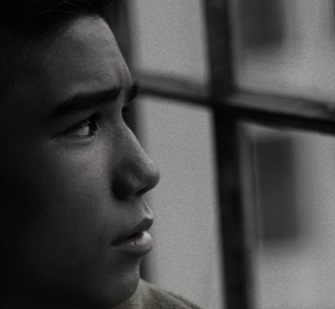
And even though teens may have pulled the shortest straw in this sence, this is also the daily reality of countless adult trans people around the world.
So when suicide rates amongst transgendered people are used to support the theory that gender-reassignment treatment doesn‘t work, or that the whole notion of being transgender is in fact just a serious mental illness, you‘re not even being served a half truth. By same method, you can probably prove that being alive is a mental illness, because that‘s the only common denominator for everyone who‘s ever committed suicide.
What? You don‘t think people are using suicide rates to prove these points? Think again. Click here. And then click here.
Transgender suicide rates are high because life isn‘t always easy if you are transgender. Even if you have access to the desired medical treatment.
What a waste. A young life ended because of lack of support. I don‘t claim to be an expert, but reading through her suicide note (that she posted on Tumblr, but was deleted) again and again, it is obvious to me that she lacked support. Not only from her family, as we‘ll get into in a bit, but also from her friends. To me, it looks like this led to a great sense of hopelessness, and may even have contributed to depression and anxiety. It‘s not a pretty picture you unveil, reading that note.
When Leelah was fourteen, she discovered the missing piece of a puzzle she had been struggling with.

„When I was 14, I learned what transgender meant and cried of happiness. After 10 years of confusion I finally understood who I was. I immediately told my mom, and she reacted extremely negatively, telling me that it was a phase, that I would never truly be a girl, that God doesn’t make mistakes, that I am wrong. If you are reading this, parents, please don’t tell this to your kids. Even if you are Christian or are against transgender people don’t ever say that to someone, especially your kid. That won’t do anything but make them hate them self. That’s exactly what it did to me.“
Gradually, her parents seem to have taken a stance against her in regards to her identity, and punished her for acting out in search of herself.
„Although the reaction from my friends was positive, my parents were pissed. They felt like I was attacking their image, and that I was an embarrassment to them. They wanted me to be their perfect little straight christian boy, and that’s obviously not what I wanted.
So they took me out of public school, took away my laptop and phone, and forbid me of getting on any sort of social media, completely isolating me from my friends. This was probably the part of my life when I was the most depressed, and I’m surprised I didn’t kill myself. I was completely alone for 5 months. No friends, no support, no love. Just my parent’s disappointment and the cruelty of loneliness.“
Keep in mind what I wrote earlier about the fragile life of a teenager. How can you not see a disaster in the making here?
Unfortunately, it seems the answer lies in the religious believes of Leelah‘s parents. In her mother‘s words:
„We don’t support that, religiously. But we told him that we loved him unconditionally. We loved him no matter what. I loved my son. People need to know that I loved him. He was a good kid, a good boy.“
The parents have taken some heavy hits because of this and are being blamed for Leelah‘s death. It is a dangerous path to go down, but I can‘t help but to think the blame is placed accurately.
How can you tell your own child that their core sense of self is wrong, because a supreme entity „doesn‘t make mistakes“? Apart from the damage done by maintaining that Leelah was wrong, she also had to live with her being a „mistake“.
Before I go on, I think I need to clarify something, for honesty‘s sake: I am an atheist. I‘m happy for those who find personal comfort, guidance or satisfaction in faith, and I have no trouble with others having something to believe in. But I strongly oppose to any form of oppression in the name of religion.
If it seems like I‘m lashing out towards religion in general in this article, that is not the case. I will assume that the majority of people are nice. You know, people like you or me – we get along nicely with each other, don‘t we? But then, there are these people:

• Mission: America published a flyer, teaching middle school children to hate gay people.
• Some common lies told by conservative hate groups.
And, finally:
• Sarah Ditum dosn‘t belive Leelah Alcorn was a good enough source to say why she took her own life.
You see, there is a red thread going through this all: „I know what you are, better than you do yourself, because I have an old book.“ And this is exactly what Leelah‘s parents did. They told her she was wrong, in all and any way, because they believed the book didn‘t agree with the path laid in front of Leelah. They told her see was „choosing“ something they „knew“ was wrong.
Try this: „Stop being so short! It‘s wrong! Everyone around you is tall and thus it is what is right, so you shouldn‘t choose to be short!“
And now imagine you kick one of your children out of the house for being short, because a book says that some ancient people said it was bad to be short. How do you do that? How do you choose your God over your children, when it is so obvious that your children need you? That they are drowning and you are their lifeboat?
What kind of person do you have to be to do that? Is this acceptable in the human society?
Even though her mother says she loved „him“, it is obvious (even by that very statement) her parents didn‘t support her. And what kind of love is without support? As a parent I can not understand this cruelty. And as an atheist, I do hope people of religion struggle with it too.
I don‘t know how big a percentage this makes up of Leelah‘s decision to step in front of a moving tractor trailer to end her life at only 17, but I‘m guessing it‘s a considerable number.
Having being banned from all social interactions, as a punishment for being trans, Leelah seems to have lost the hope she found when she was fourteen.
„I have decided I’ve had enough. I’m never going to transition successfully, even when I move out. I’m never going to be happy with the way I look or sound. I’m never going to have enough friends to satisfy me. I’m never going to have enough love to satisfy me. I’m never going to find a man who loves me. I’m never going to be happy. Either I live the rest of my life as a lonely man who wishes he were a woman or I live my life as a lonelier woman who hates herself. There’s no winning. There’s no way out. I’m sad enough already, I don’t need my life to get any worse. People say ‘it gets better’ but that isn’t true in my case. It gets worse. Each day I get worse.“
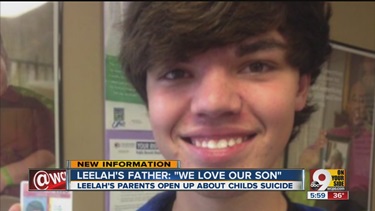
Oh, but it didn‘t have to play out like that. That is the real tragedy. Leelah could have transitioned later in life. She could have gained friends. She could have loved and been loved. She could have been successful in her own opinion. She could have won.
Even though it is true that an early transition (including hormone replacement therapy and sometimes gender correction surgery) is more „successfull“ in the sense that Leelah would not have gotten as masculine over the years, there are many stories of transwomen who have transitioned late, but are happy in their own skin. In relationships. Surrounded by friends. Supported. Loved.
Granted, there are also stories of the opposite, but Leelah had no way of knowing which would come true for her. She had been deprived of hope, forced into desperation. She didn‘t see any light through the darkness of the current situation. Someone had turned it off.
And she‘s not the only one left alone in the dark.
In the last lines of the last letter Leelah ever wrote, she asked the readers to fix society. She asks for enlightenment and education about gender and transgender people. In my opinion, she has already succeeded in this, as the news of her death have gone wide and far. We must never forget, and we must continue to tell her story, to educate those around us.
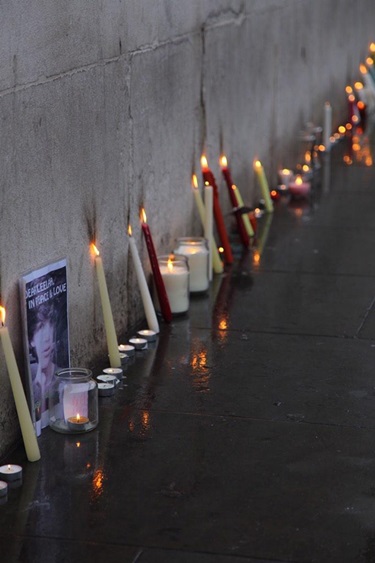
My fear is that because of the obstacles she faced at home, she missed out on the opportunity to learn more about herself.
In many countries, transgender people form some sort of community, that offers help and information to it‘s members. When you are taking the first steps out of your own shadow, you can reach out and get help and support. And more importantly, get a confirmation that it doesn‘t have to be all bad. Transgender people often share stories with each other, of struggle and difficulties, but also of good things, positive things. Stories of success.
I really wish Leelah had been encouraged to make such contact, instead of being told she was wrong. Who knows, it might have been enough to get her through the difficulties and into adulthood. She might have had a wonderful life. We might never have heard of her.
„The only way I will rest in peace is if one day transgender people aren’t treated the way I was, they’re treated like humans, with valid feelings and human rights. Gender needs to be taught about in schools, the earlier the better. My death needs to mean something. My death needs to be counted in the number of transgender people who commit suicide this year. I want someone to look at that number and say ‘that’s f***ed up’ and fix it. Fix society. Please.
Goodbye,
(Leelah) Josh Alcorn“

